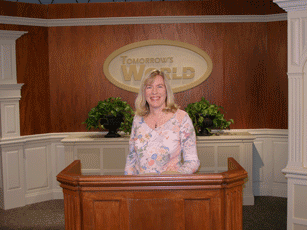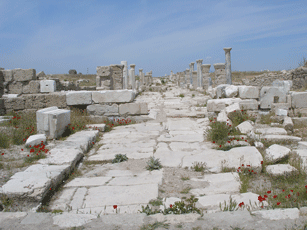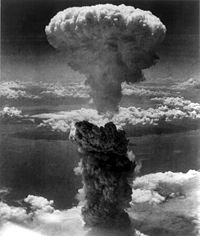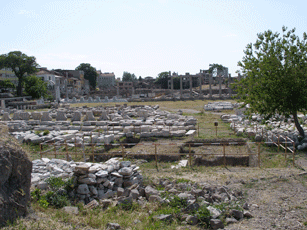LCG, Jews, Protestants, Etc. to Celebrate Pentecost
Saturday, June 7th, 2008Jesus taught, “narrow is the gate and difficult is the way which leads to life, and there are few who find it” (Matthew 7:14),. Pentecost pictures that only a few will find the way in this age–but implies that others will later.

A “straight and narrow way” in Tobago
Tonight beginning after sunset, until tomorrow at sunset is the Holy Day known as Pentecost. 1,977 years ago, the disciples of Jesus were meeting together to observe this day (Acts 2). On that day the Holy Spirit was given and the New Testament Church began.
Of course, since it was also originally observed by Jews and other Israelites, it would make sense that the early Christians kept it (as they kept Passover and other such days).
Observant Jews still keep it as the following news article shows (though they call it Shavuot):
The long lost significance of Shavuot (Shavuos)
However you pronounce it, Shavuot has been around for a long, long time, and it seems that many Jews tend to overlook its timeless significance. In order to glean some of this festival’s original meaning, imagine popping something into the oven and never being able to look at it until the timer goes off. Is that how you’d want to make your mychel, your “oneof a-kind dish?” Of course not! You’d want to check on it at least once (and in most cases several times) in order to see that it’s coming out as you’d hoped and to do this or that to it, to “potchke” around with it.
Well, anyway, on one level, that’s sort of how Shavuot functioned in the ancient Jewish calendar of festivals. Seven weeks and a day after the ceremonial Omer sacrifice was made on the second day of Pesach- originally a planting festival- Shavuot would auspiciously mark the harvesting of one of the season’s first crops, typically barley, or perhaps some other kind of grain indigenous to Israel. This initial harvest would give an early indication as to how all the crops were faring and, accordingly, if the Almighty was favoring the people that year with a bounteous harvest. That’s the agricultural reason behind why the Omer period in its entirety was traditionally marked with solemnity, because no one wanted to inadvertently anger G-d before the crops were known to be growing properly.
Being as how most of us are so far removed from the annual agricultural cycle and how we often take for granted how dependent we all still are on G-d’s graciousness when it comes to basic needs such as health and sustenance, it’s easy to grasp how the profound significance of Shavuot might be lost on increasingly urbanized Jewish societies.
But what then of the spiritual side of Shavuot? What about its historical linkage to the receiving of the Commandments at Mt. Sinai? After all, no stream of Judaism can downplay the centrality of Torah to Jewish life in every new generation, defining Shavuot as indeed one of the most significant holy days of the year! http://wwwjewishvoicesnj..org/news/2008/0604/religion/
Many Jews believe that the ten commandments were given on Pentecost.
Additionally, some Protestants do observe Pentecost as well, as the following news article shows:
Christians prepare to celebrate the church’s birth
Unlike those two well-known holidays, Pentecost — commemorating the arrival of the Holy Spirit — is not widely observed, even by many Christians…
Christian authors Norman Shawchuck and Rueben P. Job describe the connection in “A Guide to Prayer for All Who Seek God”: “God in Christ became incarnate in ordinary disciples. The faithful continue to receive this gift of God-dwelling-within to provide direction, courage, comfort, hope, companionship and peace.”…
Pentecost emboldened ordinary people to go out and take risks and give their lives for their faith, she said.
Catholics also keep it, though they were about a month early this year (see Pentecost is Not Supposed to be in May for 2008).
The Living Church of God believes that the New Testament church began on Pentecost in 31 A.D. and that its observance in the Book of Acts shows that the early disciples clearly did believe that they were to continue to observe practices (Sabbaths, Holy Days, etc.) that the Jews did.
Some articles of possibly related interest may include:
Pentecost: Is it more than Acts 2? Many “Christians” somewhat observe Pentecost. Do they know what it means? It is also called the Feast of Harvest, the Feast of Weeks, and the day of firstfruits.
Pentecost Quiz This is a Pentecost quiz based upon the Old and New Testaments in the Bible.
The History of Early Christianity Are you aware that what most people believe is not what truly happened to the true Christian church? Do you know where the early church was based? Do you know what were the doctrines of the early church? Is your faith really based upon the truth or compromise?
Is There “An Annual Worship Calendar” In the Bible? This paper provides a biblical and historical critique of several articles, including one by WCG which states that this should be a local decision. What do the Holy Days mean? Also you can click here for the calendar of Holy Days.
The Ten Commandments in Hebrew This is a photo of a Hebrew document from the 2nd century, B.C.
Were the Ten Commandments in Effect Before Mount Sinai? Some have said not. This article provides biblical quotes to answer this important question.
Job and the Ten Commandments Was Job written prior to Mount Sinai? Did Job know about the ten commandments? This article provides biblical answers to those questions.
What Did Jesus Teach About the Ten Commandments? This article quotes what Jesus actually said about them (His words are in red).
Were the Ten Commandments Nailed to the Cross? Some have said so. This article provides some biblical quotes to answer this important question.
What Did Paul Actually Teach About the Ten Commandments? Many say Paul taught against the ten commandments. Is this true? This article quotes Paul with his words in green.
Are the Ten Commandment Still in Effect? This article quotes the ten commandments and combines some of the previous articles into one article about the ten commandments. The commandments are shown at Mount Sinai, before Mount Sinai, in the teachings of Jesus, after the crucifixion, and in the teachings of Paul. It addresses the most common “traditions of men” regarding them as well.
Were the Pharisees Condemned for Keeping the Law or Reasoning Around it? Many believe that the Pharisees were condemned for keeping the law, but what does your Bible say? If they were not condemned for that, what were they condemned for?
The Ten Commandments Reflect Love, Breaking them is Evil Some feel that the ten commandments are a burden. Is that what Jesus, Paul, Peter, James, and John taught?
Was the Commandment to Love the Only Command? Some have stated that John’s writings teach this, but is that what the Bible really says?
The Ten Commandments and the Early Church Did Jesus and the Early Church keep the ten commandments? What order were they in? Here are quotes from the Bible and early writings.








 VS.
VS. 

